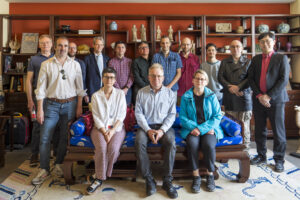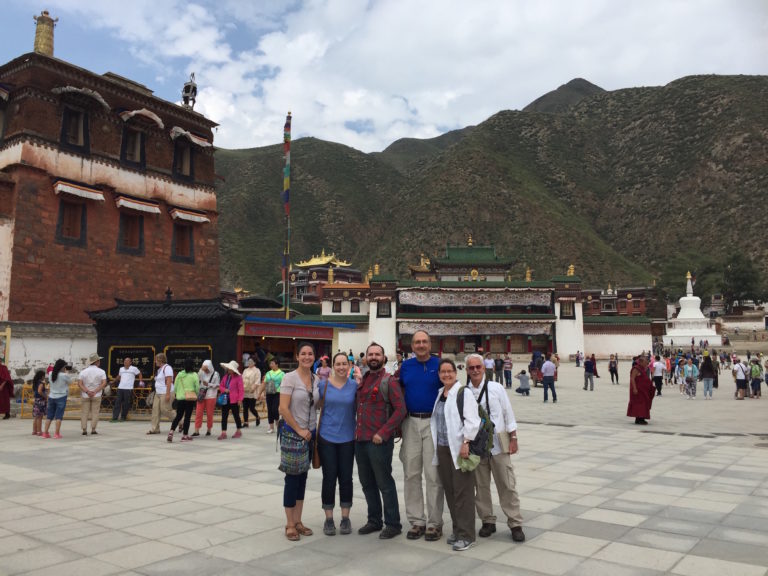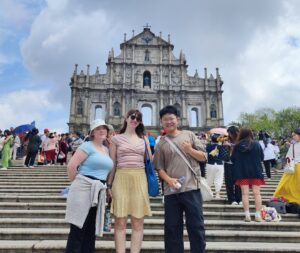Dr. Ann Hoffmann and her family embarked on the Silk Road Trip with the TBC staff and students this fall. They brought along with them the necessary medical supplies and their bright smiles on the trip. Without their help and care for the students, the trip might have not gone well for a few. We are extremely grateful to have had them on the trip and wanted to hear from them their intake from the trip.
What is your best memory from the Silk Road excursion?
My best memory would be going to the Tibetan city of Xia’he. The people were so welcoming and visiting the Labrang Monastery. Doing “morning prayers” by circling the Monastery and spinning the prayers wheels with the local people was magical. The monks at the Monastery were friendly and inviting and the Tibetan family’s home we had dinner at with singing and dancing gave us a better understanding about how the local people lived.
What was your first impression of the schedule of the Silk Road trip?
First impressions of the Silk Road schedule was one of excitement and awe at all that we were going to do and see in such a short amount of time. We knew it was going to be a vigorous and exciting time!
What was your highest and lowest point (if any) on the trip?
The most talked about adventure all the students were looking forward to was the camel ride (and was an incentive for sick students to adhere to their prescribed regimen to get better for this). For myself, there were so many “high points”, including seeing the ancient Mogao Caves and thinking about what a great effort it took to make them and what a historical treasure they are, having lunch and music and dancing hosted by Uyghur people and appreciating their beautiful culture, seeing the Terra Cotta warriors in Xi’an, having wonderful meals with such a wide diversity of foods and flavors, getting to hear the students presentations of their topics pertaining to China and being with such a fabulous group of people are just some of the wonderful “high points”.
How did you and your family stay healthy throughout the trip?
My family and I stayed healthy by drinking bottled water and trying to eat cooked foods and brushing our teeth with our bottled water. We also had Pepto-Bismol along and knew when we started to get some loose stools to start to take the Pepto-Bismol and to adequately keep up on our fluids (sports drinks were a great help to provide fluids and electrolytes, and fortunately, most of the bigger cities we went to had these available).
When students were getting ill, how did you and your family manage the situation especially when the number of sick students was increasing?
Our adult children knew David and myself were there to take care of the students and faculty and were very supportive. David and myself and our adult children knew to keep up on our fluids in the heat and to use Pepto-Bismol, if needed, before getting worse and to drink plenty of fluids/stay hydrated. (If you are feeling thirsty in the heat, you are already dehydrated as you sweat more than you realize)
For those who go on short rigorous trips like the Silk Road, what advice do you have to stay healthy? How do you keep up the groups’ morale?
Before anyone goes on a physically vigorous trip, they should be doing aerobic exercises and eating healthy. Once on the trip they should be drinking bottled water (even brushing their teeth with bottled water) and making sure they drink adequate fluids so they are maintaining their regular urination pattern. They should avoid overuse of alcohol and caffeinated beverages as these types of fluids can promote dehydration in the heat. They should pack Pepto-Bismol tablets and start taking it if they start having loose stools (we do not recommend Loperamide as this product just slows down the gut and does not treat the loose stools/diarrhea). If someone starts to gets loose stools, they should drink plenty of clear fluids (sports drinks are good as they help replace electrolytes being lost) and start a BRAT diet (which stands for bananas, rice, apples, tea, toast—also yogurt with active cultures and oatmeal all help to firm up the stools). All the TBC staff was wonderful and so very thoughtful and accommodating to all the students and myself and my family. They were wonderful to be with and I cannot say enough good things about each of them–they were so helpful and caring and the students experienced this first hand as well as myself and my family.
How was your experience interacting with the TBC students for two weeks?
The students were delightful, inquisitive, patient and kind. We enjoyed our conversations talking about all kinds of subjects with them and getting to know them on a more personal level as well. They were very compliant and trusting of my husband and myself as physicians making health decisions to best help them.
How different was this semester’s Silk Road trip compared to the previous ones you’ve been on with TBC? The number of sick students this semester was higher, what do you think led to that increase?
We went on the Yunnan trip in 2015 and we had home visits on the Yunnan trip, whereas we stayed in hotels and did a lot of train travel with the Silk Road trip. They are 2 very different trips but both wonderful and we felt we got to see a huge variety of the cultures and peoples in China. Both of our trips have been delightful. Some of the students got heat exhaustion this Silk Road trip. It might be advisable to forego vigorous physical activity when temperatures are >100F (>37.7C) and do “cooler” activities/less strenuous activities in the heat (I was thinking about the 106F/41.1F temperature when we were in Lanzhou and everyone could choose to ride a bike on the city wall or go to a museum) and remind everyone to push fluids and have extra fluids extremely easily available at all times. I think we had a surge in diarrhea after we all ate at the Tibetan family home. When there are a greater number of people getting the same symptoms all at once, it usually means they shared a common food—so that is what I suspect but have no way of proving it or what the common food was. Also, to prevent illness, it might be wise to use a serving spoon in common food dishes on the table at group meals instead of everyone using their own chopsticks to serve themselves from a common bowl.
If you could describe the trip in one word, what would it be and please explain why you chose that specific word?
Extraordinary!—we had a Fabulous Adventure of a Lifetime! We got to meet people and do and see things we do not ordinarily do and would have never imagined; the Silk Road trip was more than we hoped for or imagined and we got to see and do so very much. The TBC staff is of the highest caliber people in the world and the students were wonderful to be with and talk to and get to know.
Dr. Ann Hoffmann, Interviewed by Li Qui Chu Lina Lee, Loyola University Chicago, TBC Communications and Social Media Intern and Fall 2016 Student



